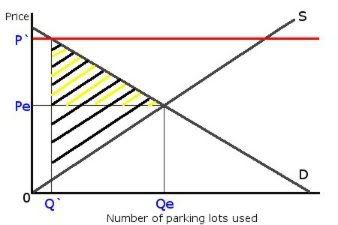Since it's National Day, maybe I should do a bit of my patriotic duty by slamming criticism of the government. I'm proud of Singapore, man!
About a week ago, I read a blog entry complaining about the government's approach to solving the problem of insufficient parking spaces in public housing areas. Apparently, the authorities decided to double "the overnight parking fee from $2 to $4". Cars need to find a place to park at night. You increase the parking fee, they still need to park there if they have to. How is increasing the fee from $2 to $4 going to help?
Planning guys! Planning. Either you increase the number of parking spaces or you decrease the number of cars on the road. Increasing the parking fee only give you a bigger bonus at the end of the year. It does not help anyone at all. End of the day, those car still need to park somewhere.
Tsk, tsk. This ignorant bad person obviously needs to get into the shoes of a bureaucrat. Here is a very simple economic model that shows the supply and demand of parking spaces and the effect of price fixing on the market, which I think is sufficient to explain the situation:
*I meant "spaces" not "lots"
The two grey diagonal lines represent the supply (S) and demand (D) 'curves' for parking spaces respectively. The y (vertical) axis of the graph measures the price of each parking lot, while the x (horizontal) axis measures the number of parking spaces used. Clearly, the graph shows the relationship between the price and the number of parking spaces used.
If the market is left to sort itself out, the common assumption is that it would default to a 'natural' sort of equilibrium. The equilibrium (default state of the market at which an equilibrium price is charged and an equilibrium number of parking spaces are used) point would be where the S and D curves intersect. So the equilibrium price would be represented by 'Pe' and the number of parking spaces used would be represented by 'Qe'. That is the point at which supply meets demand, so to speak.
However, let's say that in actual fact there aren't as many parking spaces as 'Qe'. Imagine that the S curve is vertical in the short term, since building of new car parks would take time or there just isn't enough space in the near future. Let's say there really are only 'Q`' number of parking spaces in the short term. So what happens then? The price has to correspondingly go up to 'P`' to reflect the reality of a shortage of supply.
But of course the real world doesn't quite work that way. Parking fees in public housing areas are most likely set by the authorities. That means when the authorities realise that there are too few parking spaces to meet demand, they would fix the price at a higher level in order to curb use and reserve available places for those who need them the most and are therefore willing to pay.
So what happens in the above model is the authorities would impose the price of 'P`', represented by the red line, in order to meet a target of 'Q`' number of parking spaces used. In other words, this is similar to ERP and such price-based congestion-reducing measures. You increase the price (or impose a 'tax') to decrease the number of people who are ready to use the particular infrastructure.
But why not have the S curve vertical in the model to approximate reality better? First of all, as discussed above, since parking fees are set by the authorities, I want to show the effects of price fixing rather than those of limited and very inelastic supply. Secondly, I'm not sure that 'P`' is the price that corresponds (given demand) to the actual number of parking spaces available, so I can't say that 'Q`' is the number of parking spaces available in reality. Thirdly, this is just an example using very basic economic concepts, so it may not be the best model. Lastly, this can reflect the real situation in the longer term, when there is enough time to increase the supply of parking spaces.
So one of the things worth talking about is not the fact that people still need to park their cars despite the price increase, which is neither here nor there as it skips any attempt at rational analysis, but the fact that there is deadweight loss as represented by the shaded area. However, what is more relevant in this situation is not even that, since we are speaking from the public's point of view, but the loss of consumer surplus, which is represented by the black and yellow shaded area. This area represents the utility loss of those people who don't get to use the parking spaces they otherwise would have used because the fee is now higher than they deem affordable.
Now, it's probably the case that, in the short term, demand for car parks is more inelastic than shown (D curve more vertical) so doubling the price would indeed not result in a significant reduction in the number of parking spaces used. However, this doesn't necessarily mean that people can either have nowhere to park their cars or pay up, as the blogger seems to imply. They may decide to use non-public car parks since those are no longer as expensive relative to public car parks, or they may be more willing to risk parking illegally. More importantly, in the longer run, this may discourage people from using personal vehicles, allowing the supply of car parks to catch up more easily with the demand.
So although this measure is not exactly good in the short term, it's a reasonable enough solution for the longer run. Besides, in the first place, what else can be done in the short term?
The reality is increasing the supply of parking spaces is not a short term solution, nor is managing the trend of growing use of personal vehicles. In fact, the increase in parking fees, as I've explained, is one way of doing the latter. Furthermore, the officials quoted in the news article this blog entry cites do talk about the need for longer-term solutions, so the entry proves to be very selective in what it mentions. And it certainly ignores the fact that, from an economic point of view, the price increase would better reflect the situation on the ground, giving preference to those with greater need and hence (presumably) greater willingness to pay.
So I've written one of my longest entries ever just to discuss a relatively trivial issue. But the point isn't really to prove that blogger wrong. The point is to illustrate that you don't have to be an expert to criticise something, as many people in Singapore like to imply (when it suits their purposes), but you should at least think through what you're saying. As it is, given such a small pool of dissent in the country, there is too much crap swirling around for it to be taken seriously. Any wonder that the opposition doesn't have much credibility?
Singaporeans like to complain about small things—well, who doesn't? But get it right more often. For a nation of brilliant scorers, we say a lot of stupid things.
Now go watch the parade.



